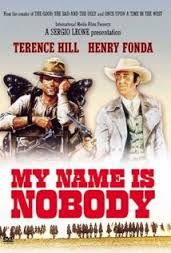
MY NAME IS NOBODY
Italy, 1973, 116 minutes, Colour.
Henry Fonda, Terence Hill, Jean Martin.
Directed by Tonino Valerii.
My Name Is Nobody shows how Terence Hill keeps coming up in the world. From knockabout Westerns to satire to a Sergio Leone production and the company of Henry Fonda. This film is very enjoyable. It has an amount of Trinity humour, quite good except for some coarse and brutal touches. It has a good enough plot, western heroism, chase and shootouts. But, most of all, it has an entertaining mock-heroic look at western myths and traditions, finally glorifying the past which it quietly mocks. And then it has some good satiric touches and some flashy photography. As with most Italian Westerns, the music contributes a great deal to atmosphere.
1. The irony of the name of the film and its play on the "Trinity" series? What western conventions did the film use? How well?
2. How did the film illustrate the spaghetti western styles of Italy? The use of close-ups and profiles, the atmospheric sequences, the use of music as important for themes: Nobody's theme and The Ride of the Valkyries for the wild bunch etc.?
3. How engaging was the basic plot? The use of the chase of Jack Beauregard and the wild bunch? How did the film use the convention of the chase differently?
4. How important was heroism for this film? How was Nobody the hero of the film? His use of the gun, as a cowboy, as a protector? His idealisation of Jack Beauregard as hero? Why did he see Beauregard as a hero? How did he force him to be a hero?
5. Was Jack Beauregard really a hero? The Henry Fonda style? His history of shortcuts? His decision to go to Europe and his trying to go to Europe? His having to face the wild bunch? His having to face Nobody? What traditional embodiments of heroism did Jack Beauregard have?
6. How was Nobody presented as a guardian angel? How different a slant for a Western was this? How important for the plot? lbw successfully did he protect Jack?
7. How successful was the humour of the film? As associated with Nobody? From the initial fishing, to the fastness of the guns, to the styles of fighting, to the particular devices, e.g. the carnival?
8. How successful a satire was the film? How were the conventions of the West being satirised? The obvious satire on the wild bunch, the obvious satire on the hero going to Europe? The satire of Nobody being successful? The satire on the villains and the mines etc.? How villainous was the villain? Was this important?
9. The film did not have much violence. How much of an asset to the film was this? Was the violence necessary? Much of it was 'knockabout' violence, was this necessary?
10. Which special effects were the most effective in the film? Especially the use of the carnival, the use of the mirrors in the carnival? Nobody's effective shooting? The way that the wild bunch were filmed? The final explosions blowing up the wild bunch.
11. How grand was the finale? The role of history? Of Jack Beauregard against the wild bunch? The use of the explosives etc.? The visual use of the pages of history? How serious, how ironic, how satirical was this?
12. The final sequences might have seemed anticlimaxes? The shootout between Jack and Nobody. How important was this? For the myths of the west? What myths did the film satirise? Which did it glorify? The importance of Jack's final letter to Nobody? The fact that he went to Europe?
13. The film had a mocking tone, although gently mocking. How effectively did it mock the western? On the other hand the film utilised the conventions and glorified the western. How justly did it glorify the western?
14. The film was made by Italians. Do they have a clearer insight into the meaning of the west than the Americans? How important are humorous films like this so that we all enjoy the west but not take it too seriously? Why? The debt to Sam Peckinpah's westerns?